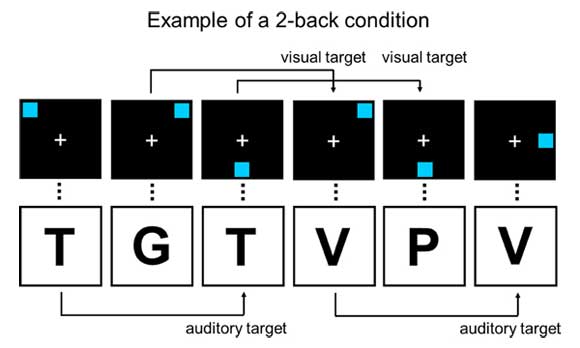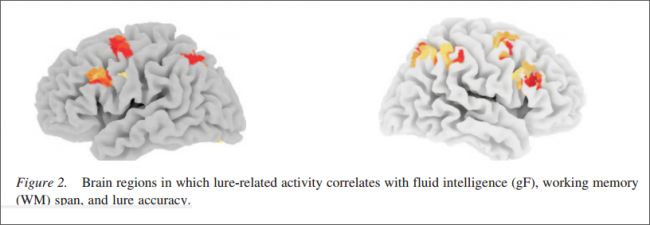Triangulating for Stable Results
Single peer-reviewed scientific studies are never enough. Scientists must compete, collaborate, and triangulate on phenomena with multiple methods in multiple labs. This produces stable results. One should ALWAYS be skeptical of the first results. Including one’s own.
Skepticism and the call for follow-up studies has been rightfully applied to Jaeggi and colleagues’ study showing fluid intelligence (Gf) gains from training with the dual n-back, back in 2008: Improving fluid intelligence with training on working memory. Gf is our reasoning and problem solving IQ, independent of cultural or background knowledge.
We are now at the end of August, 2014, and sin-ce 2008 dozens of labs have now run experimental studies looking closely at the effects of dual n-back training on Gf among other cognitive abilities such as attention, executive functioning and short term memory.
It is this kind of dual n-back training that IQ Mindware apps are built on.
IQ Gains from Dual N-Back Training: A Definitive Meta-Review Published in August 2014
This body of dual n-back research has now been collectively analyzed in a meta-study by Jacky Au and colleagues in their article:
Improving fluid intelligence with training on working memory: a meta-analysis
Their scientifically definitive study concludes:
“Our work demonstrates the efficacy of several weeks of n-back training in improving performance on measures of Gf. We urge that future studies move beyond attempts to answer the simple question of whether or not there is transfer and, instead, seek to explore the nature and extent of how these improved test scores may reflect “true” improvements in Gf that can translate into practical, real-world settings. (Au et al, 2014).
Not only is there a significant increase in IQ from n-back training, the effect generally observed in the scientific studies is likely to be an under-estimate, due to the following:
- The majority of subjects in these studies have been undergraduates. Sampling from restricted ranges of the total population usually biases effect sizes downward.
- The kind of ‘split-testing’ IQ tests used in these studies also causes downward biases in the effect size.
Thus the authors conclude:
“the results reported in this meta-analysis represent a low-end estimate of the true extent of improvement that n-back training can have on measures of Gf.”
The authors argue that evidence suggests the effect size could be further increased by optimizing certain parameters including:
- Program completion
- Increasing the internal motivation to engage in the exercise
- Reducing training session length to e.g. 15-20 minutes per session.
These are precisely features that have been optimized in the IQ Mindware app IQ Prime, as well as other relevant parameters, helping explain why I can confidently guarantee a 10-20 point IQ gain from 20 days of training.
IQ Mindware products build in incentives that stimulate intrinsic motivation to complete the 20 day program, and Session lengths are half the time of the standard dual n-back games investigated in the laboratory.
Dual N-Back & Interference Control
Brain imaging studies by Burgess, Gray, and fellow grad student Tod Braver (article 1, article 2) has found that brain regions common to fluid intelligence and working memory became more active when there was more need to filter out distractions (‘lures’). The brain areas underlying both interference control, working memory capacity and fluid intelligence were the lateral prefrontal cortex (lPFC) and parietal cortex, shown in the fMRI images below which show activation in both the left and right hemispheres of the brain.
This suggests a critical insight for optimizing IQ gains from training with the dual n-back:
- Building the need to filter out distractors (‘lures’) into the dual n-back game will result in greater IQ gains by exercising interference control.
This is precisely what I have done with the IQ Mindware apps. Interference control is an integral feature of the IQ Mindware dual n-back games. This type of dual n-back training is called 2nd generation (2G) n-back training. Standard dual n-back exercises do not build in interference control training.
Summary
Au’s meta-analysis of the dual n-back training literature – Improving fluid intelligence with training on working memory: a meta-analysis – has laid rest to the controversies surrounding IQ gains from dual n-back training. Dual n-back training does result in IQ gains, provided relevant criteria (such as program completion) are met.
(Through personal correspondence I have been informed that another meta-analysis of all the dual n-back studies, soon to be published by a graduate school colleague J. Chein,, also concludes that dual n-back training results in significant fluid intelligence (IQ) gains.)
IQ Mindware’s HighIQPro brain training app has been optimized based on the recommendations outlined in the Au and colleagues’ meta-study. These apps also incorporate interference control – which standard dual n-backs do not. Interference control, we have found, is a key parameter for optimizing IQ gains from training.



